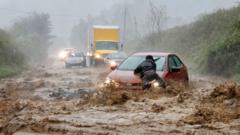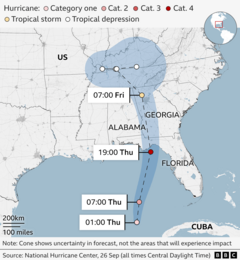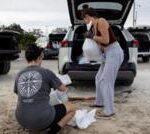The state of Florida has issued a number of mandatory evacuation orders as Hurricane Helene strengthened over the Gulf of Mexico.
As of Thursday morning, the storm had grown into a category 2 hurricane and is expected to make landfall on Florida’s Big Bend later in the evening.
Officials have urged people to heed evacuation orders, warning that the storm will bring “life-threatening” weather to the region with destructive winds and significant storm surge.
It is expected to make landfall as a category 4 hurricane south of Tallahassee, a city that has not seen a storm of this magnitude in recent memory.
Hurricane Helene has been described as “catastrophic” and “unsurvivable” by officials, who warned that it will bring with it a storm surge of up to 20 ft above ground level in some areas of the Big Bend.
“This forecast, if realised, is a nightmare surge scenario for Apalachee Bay,” the National Weather Service office in Tallahassee warned in a bulletin.
Michael Brennan, the director of the National Hurricane Centre (NHC), said on Thursday that residents under evacuation orders still have time to get out, but added that “conditions are going to deteriorate quickly.”
Power outages, tree damage and powerful winds that could tear roofs off of structures are expected, Mr Brennan said, as well as significant rainfall of up to 18 inches that could bring flash flooding in some areas.
The storm has been described as “very large” by Florida Governor Ron DeSantis, who warned on Thursday that it will bring with it tropical storm conditions to much of his state.
Around 14 tornado warnings were issued overnight on Wednesday, and DeSantis warned that more were likely in the coming day.
He added that Tallahassee, Florida’s capital city of 200,000 residents, could be significantly affected if the hurricane makes landfall directly on the city.
“This area has not had a major hurricane hit in quite some time, and nobody in recent memory has seen a storm of this magnitude hit,” DeSantis said.
As of 11:00 EST (16:00 GMT), Hurricane Helene was about 255 miles (405 kilometers) from Tampa, Florida, according to the NHC, with maximum sustained winds of 105 mph (165 km/h).
DeSantis urged residents in the impacted regions to leave as soon as possible, as the hurricane is forecast to travel quickly towards the state.
“Every minute that goes by brings us conditions that are simply going to be too dangerous to navigate,” he said.
Michael Bobbit, a clam farmer in the island of Cedar Key on Florida’s Big Bend, said that some people in his community have decided to stay behind despite the warnings.
“The last several hours have really just been a frantic effort to beg people to leave,” Mr Bobbit, 48, told the BBC. “Here in Florida, we sort of believe that we’ll just ride it out, it’s no big deal. But this is not one of those storms.”
He added that locals have been trying, “to sandbag as many buildings as we can,” as well as board up windows and get the island’s clam farms secured.
“The mood is sombre,” Mr Bobbit said. “A lot of people when they’re leaving the island are hugging each other and crying, saying ‘I hope we have a home to go back to.'”
Governor DeSantis cautioned that people should anticipate travel disruptions. Tampa International Airport and Tallahassee International Airport were both closed on Thursday ahead of the storm.
Search and rescue teams have been mobilised should they be needed, DeSantis said, and shelters have been opened for residents in affected areas.
The hurricane has also affected the race for the White House, with the Republican candidate for vice-president, JD Vance, cancelling two events in Georgia that were planned for Thursday.
Hurricanes need sea surface temperatures of more than 27C (80F) to fuel them.
With exceptionally warm waters of the Gulf at 30-32C (86-89F), the sea surface is about two degrees Celsius above normal for the time of year.
Florida’s 220-mile (350-kilometre) Big Bend Coast is where Hurricane Idalia made landfall in 2023. The area was also battered by Hurricane Debby last month.
The Florida Division of Emergency Management has posted a list, external of the counties in which voluntary or mandatory evacuation orders have been issued ahead of Helene.
Sign up for our Future Earth newsletter to get exclusive insight on the latest climate and environment news from the BBC’s Climate Editor Justin Rowlatt, delivered to your inbox every week.
Outside the UK? Sign up to our international newsletter here.

















